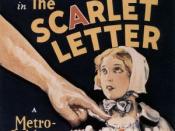The Scarlet Letter One of the most important themes in The Scarlet Letter is that a person must be true to himself and to those around him. Hawthorne state this theme directly in chapter 24 when he said, "Be true! Be true! Show freely to the world if not your worst than some trait whereby the worst may be inferred." The benefits of complying with this idea can be seen in Hester, while the pain caused by going against it can be seen in Dimmesdale.
To Hawthorne, hypocrisy is the ultimate evil. He portrayed the idea that a person should not claim to be one thing while being another in reality; although it is not necessary for a person to show his worst characteristic, he should not pretend to be the opposite of what he really is. Hawthorne used Dimmesdale as the example for this lesson.
Dimmesdale did not show the world his worst, or any trait where the worst could have been inferred.
He failed to come forward and confess to the people his role in the crime for which Hester's had been condemned. Because he let his scarlet letter "burn in secret" and went on giving his hypocritical sermons, guilt and suffering built within him; as Dimmesdale said, his secret "ruined" and "polluted" his soul. It is difficult to imagine that the punishment the people of the town would enforce on Dimmesdale could be worse than the punishment he inflicted upon himself.
This theme was closely related to the theme that the punishment imposed on us by others may not be as destructive as the guilt we impose on our self. Assuming this statement to be true, Dimmesdale would have been better off sharing his secret with the town to alleviate his guilt and...


